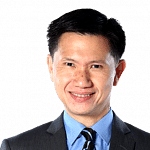In death, as in life, Lee Kuan Yew elicits reactions and responses near and far that few global leaders can match.
After the initial period of universal accolades, the written annals on Mr Lee's legacy will likely become more mixed. He did many good things for Singapore but not without flaws and shortcomings. Yet from Singapore's immediate neighbourhood, Mr Lee's legacy is instructive on three fronts.
First, he was the most successful leader in contemporary South- east Asia in the task of nation- building. Singapore had to go it alone after being expelled from what was then a federation of Malay states during the time of Konfrontasi when Indonesia and Malaysia were at odds by the force of arms. In the end, it was the desperate fight for survival that became the bedrock of Singapore's success story under Mr Lee.
At home, through the People's Action Party's (PAP's) monopolisation of the electoral space, Mr Lee was given repeated mandates to rule and run the place. His administration produced jobs and found accommodation for people, turning an isolated island into a thriving magnet for business and finance. Above all, Mr Lee saw to it that Singapore spawned an education system that can produce a top-rate workforce as the gem of its national assets. Many stories will be told about Mr Lee's legacy, some good and some less so, but what he did with Singapore's education and research institutions cannot speak enough to its continuing success.
Mr Lee did it through tough political instincts and tactics. He was notorious for suing key political opponents and detractors, sometimes pushing them into financial ruin. His authoritarian style masked Singapore's electoral democracy. The PAP won all elections from the social contract it created out of delivering growth and economic development in return for an invasive, interventionist and centralised government. And Mr Lee made no qualms about what he did and why he had to do it. His fortitude and foresight were necessary for Singapore to rise. After all, during the nation-building phase in the 1960s-1980s, just about all governments in South-east Asia and many others in the then-Third World were authoritarian in one way or another.
Whether Mr Lee's 25 years of electoral authoritarianism were worth all of the restrictions on freedom and civil liberties will be debated for years on end. Certainly, his style of governing cannot be replicated today, 25 years after he stepped down from the premiership to assume a patriarchal backseat role. It was a good fit for Singapore at a time when alternatives could have been much worse in view of the dictatorship, poverty and under-development all around the island state.
Mr Lee's latent effects are self-evident. Singapore is now a highly competent and technocratic society, bent on making ever more money collectively and individually, and based on a meritocracy that is enabled by great schools and universities. After Mr Lee, the country's strong institutions will see it through but Singapore will become an increasingly normal country with more fractious politics, social divides, growth constraints, and a decreasing centralised, authoritarian control.
The second lesson from Mr Lee's time is his regional leadership. With his power base secured at home, he leveraged it to lead the neighbourhood. It was a boon for Asean to include Singapore as a founding member. Tiny, with no real natural resources, the Singapore bureaucracy helped steer and provide thrust and capacity for Asean's organisation-building in its formative years.
Mr Lee even went further and stood up to the West in the early 1990s during the so-called "Asian values" debate. In the face of exuberant growth trajectories in East Asia, certain Western countries criticised the lack of democracy and human rights. South-east Asia's leading intellectuals at the time, who happened to be mostly Singaporean from Mr Lee's educational breeding grounds, went toe to toe against their Western counterparts. Mr Lee and his crew were not anti-Western but pragmatists. They stood up against the West when it suited them and cooperated with Western governments when they needed to. Singapore has always been ultimately omni-directional, projecting in all directions and degrees that serve its national interest.
But in the early 1990s, when Asean was coming into its own, Singaporeans who grew up under Mr Lee's watch gave confidence to many South-east Asians that they could be as smart, eloquent and erudite as those in the West.
Third, Mr Lee turned his regional leadership into global statesmanship that rendered South-east Asia as a region to be reckoned with. After Indochina was lost to communism in the 1970s, the West turned away from a divided South-east Asia. It was in the 1980s and 1990s, when ideological barriers gave way to a full-bodied, 10-member Asean, that international attention turned to the region again due to its soaring growth and burgeoning regional organisation. Mr Lee was instrumental in leading South-east Asia to be registered on the map and minds of the world. As a leader of a small island, he was greeted and treated in awe on a par with those from major powers.
The lesson for nearby countries like Thailand is not what Mr Lee did then but how Singapore works now with its multi-ethnic base and well-embedded electoral system that allows the opposition to gain ground and democratic processes to run their course.
Overall, the country Mr Lee left behind will be more and more like the country he did not want it to be during his prime. Yet Singapore as a more grown-up nation with normal problems and less as a nanny state where all things are smooth but antiseptic may well be Mr Lee's most admirable legacy. As Singapore will transcend him and his era, Mr Lee may well be a happy victim of his exceptional success.
The writer teaches International Political Economy and directs the Institute of Security and International Studies at Chulalongkorn University in Bangkok. An earlier version of this article appeared in The Bangkok Post.


